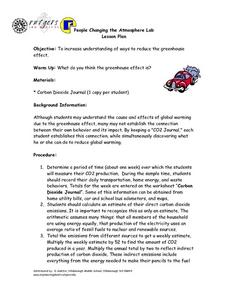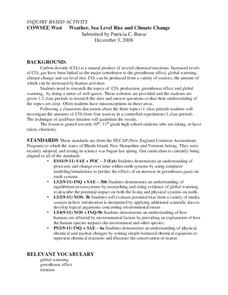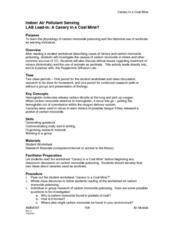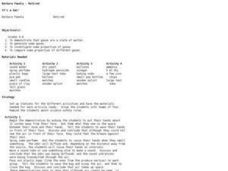Wind Wise Education
Understanding Electric Power Generation
You mean the electricity does not come from the switch? As a class and in small groups, learners explore the sources of energy used to generate electric power. Worksheets guide groups into choosing a future electricity generating...
Curated OER
Cellular Respiration and Photosynthesis
In this cellular respiration and photosynthesis learning exercise, students read through the presented material and draw an illustration of the production of ATP. Students answer several short answer questions about the production of...
Curated OER
Biodiesel: An Alternative Fuel Source
Students explore the advances that are being made in alternative fuels.In this biodiesel lesson students evaluate different petroleum and alternative fuels.
Wild BC
Greenhouse Gas Line-Up
Discuss different sources of energy and how much greenhouse gas each might emit. The six sources are then ranked according to emissions from greatest to least. Finally, the true cumulative emissions are revealed to show the class how...
Curated OER
The Influence of Human Activity on the Environment
The surge in human population in the last 2,000 years, due in large part to better health care, has brought a surge in the demand for resources and in pollution. The graphics, photographs, and real-life examples in a thought-provoking...
Teach Engineering
Enough Energy? Play the Renew-a-Bead Game
Pairs simulate the energy usage of different countries by drawing beads from a bag, which contain different beginning ratios of non-renewable and renewable energy resources. The activity concludes with a series of questions to tie the...
Teach Engineering
Photosynthesis—Life's Primary Energy Source
Wouldn't it be great if you could produce your own food? Scholars learn about the processes of photosynthesis and cellular respiration in plants. They consider how to use photosynthesis as a model of an efficient system and how to apply...
Chicago Botanic Garden
Historical Climate Cycles
Ice core samples give scientists access to climates of old—those from more than 800,000 years ago. Through an analysis of various temperature graphs from ice cores, tree rings, and weather stations, scholars compare historical climates...
Curated OER
People Changing the Atmosphere Lab
Young scholars examine ways to reduce the greenhouse effect. Students keep a "CO2 Journal" to help establish a connection between their own behavior and its impact on global warming as well as discover ways to reduce global warming.
Curated OER
Weather, Sea Level Rise and Climate Change
Students compare the carbon dioxide content of four different samples. In this chemistry instructional activity, students research the causes of global warming. They explain how humans contribute to rising global temperature.
Curated OER
Understanding pH, Alkalinity, and Hardness
Students comprehend the interactions of pH, alkalinity, hardness, and carbon dioxide in aquaculture water. They read the SRAC fact sheet number 464 "Interactions of pH, Carbon Dioxide, Alkalintiy and Hardness in Fish Ponds." Students...
Curated OER
Indoor Air Pollutant Sensing LAB Lead-In: A Canary in a Coal Mine?
Young scholars investigate the causes of carbon monoxide in mines and other common sources of CO. Pupils read the worksheet "Canary in a Coal Mine" before beginning this investigation. They discuss ethical issues regarding treatment of...
Texas State Energy Conservation Office
Unit 2 - Section 2 - Fuels for Everything
For this alternative energy worksheet, 6th graders read and study the varying types of fuel. Students read examples and ways that alternative fuel can be used.
Curated OER
The Biogeochemical Cycles
The majority of this presentation is a collection of diagrams and graphs that back your lecture on biogeochemical cycles. The last few slides define ecosystems and the Gaia hypothesis. You may find these slides valuable, but will...
Chicago Botanic Garden
Calculating Your Ecological Footprint
You can lower your ecological footprint by recycling! Lesson four in this series of five has individuals, through the use of a computer, calculate their ecological footprints. Through discussions and analysis they determine how many...
Curated OER
Science: What Is the Carbon Cycle?
Young scholars examine the carbon cycle while identifying its sources, sinks, and release agents. Using magazines and newspapers, groups of students design collages illustrating the carbon cycle. Finally, they write responses to...
Curated OER
Biochemical Cycles: Recycling Carbon and Nitrogen
Pupils construct flow diagrams of the carbon and nitrogen cycle processes. They identify sequences in each cycle that are affected by human impact and present their research to the class.
Curated OER
Illuminating Climate Change: Connecting Lighting and Global Warming
Learners analyze energy usage and connect energy usage to fossil fuel consumption. In this global warming and pollution lesson, students what fuels are used to generate electricity and how much CO2 each fuel produces, then graph the...
Curated OER
It's a Gas!
Students investigate gases and their properties by completing 4 activities. In this gases lesson plan, students perform activities to show that gases take up space, they diffuse, and that odors and vibrations pass through gases. They...
Teach Engineering
You've Got to See it to Believe It!
Youngsters develop an understanding of how smog is produced, and how exhaust from automobiles is one of the major sources of smog. They explore the roles that engineers play in developing technologies that reduce smog, then work in teams...
Curated OER
Key Scientists in Photosynthesis Research
In this photosynthesis worksheet, learners use a textbook to research the different scientists involved in the discovery of the process of photosynthesis. This worksheet has 31 fill in the blank questions.
Curated OER
Observing the Growth Spurt
Students notice a growth spurt in their Brassica plants and closely monitor this growth by measuring their plants and predicting the next day's growth based on the pattern of their data. They also read and highlight the objectives in...
Curated OER
Biomass: The Energy of the Future
Sixth graders examine information about a variety of renewable fuels. They read key vocabulary terms, read and discuss a story handout, and conduct research on renewable fuels. Students then complete a comparison chart, and write an...
Curated OER
Chemical Consequences of Burning Fossil Fuels
Future scientists are introduced to the chemical consequences of burning fossil fuels, learning that fossil fuel combustion leads to the formation of oxides of three nonmetals: carbon, nitrogen, and sulfur, all of which end up in the...

























